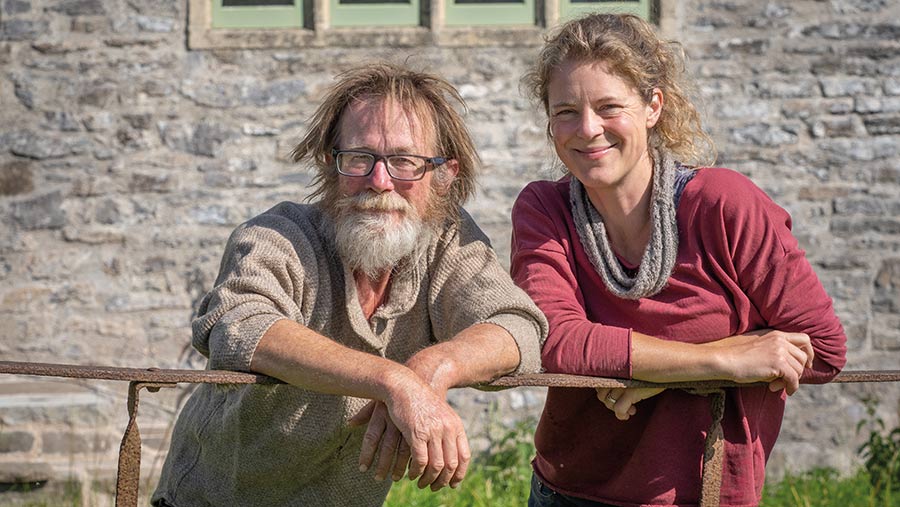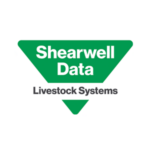How Somerset sheep farm benefits from added-value wool sales
 Andrew Wear and Jennifer Hunter © Kathy Horniblow
Andrew Wear and Jennifer Hunter © Kathy Horniblow Sales of wool products from Fernhill Farm, Compton Martin, Somerset, continue to generate extra valuable revenue for Farmers Weekly’s 2022 Sheep Farmer of the Year winners, Andrew Wear and Jennifer Hunter.
Their wool attracts a premium of up to £20/kg, and this year, New York was the destination for much of their organic clip.
See also: Lambs edge towards £150 as demand holds and supply tightens
Farm facts
- Versatile home-bred Romney cross Shetland ewes
- 1,250 ewes in total, including share-farming agreement
- Sheep are all hand blade-sheared on farm
- Lambs sold as hoggets
- Regenerative farming system with A Greener World accreditation
- On-farm events and shearing diversification
The farm owns and runs a flock of home-bred Romney cross Shetland ewes and has a separate organic flock in a share-farming agreement.
Fleece quality is one of the key considerations when selecting ewes for breeding.
Mr Wear uses traditional blade-shearing techniques and ewes are all blade-sheared in March before lambing, with the wool being graded on farm and sold on as fleeces, fibres and yarns.
Last year, the farm invested in a wool micron meter to measure the thickness and quality of fleeces, and Ms Hunter recently applied for a licence to measure wool quality for other farmers.
Lambing and grazing
Lambing began in mid-April and all the ewes lambed outside in paddocks.
As with many sheep farms this year, scanning percentages were marginally lower than last year, with slightly more singles coming through than in 2022. However, the number of ewes empty at scanning was still very low.
Ewes and lambs are kept on a predominantly grass-based rotational system.
While inflation pushed costs up on all farms during the past year, the regenerative farming model at Fernhill Farm has helped the business minimise costs where possible, with no high bills for fertilisers, herbicides or fungicides.
Use of cover crops during the winter months as part of the share-farming agreement and through partnerships with local arable farms on a pay/day-grazing basis has also helped to keep feed costs low.
“We also run sheep over local dairy farms in the winter and have conservation grazing with the National Trust and Avon Wildlife Trust on various conservation sites,” says Ms Hunter.
By removing the ewes’ wool six weeks before lambing, grazing of brambles within agroforestry is physically possible.
“Ewes are able to graze bramble patches in the woodlands, which provide essential nutrition when they go into their third trimester.”
The farm tries not to use any antibiotics and has been trialling alternative animal health stabiliser products instead, which contain good bacteria.
“We use it to eradicate watery mouth and joint ill from our sheep-shearing pens, and it heals up foot-rot and flystrike within a matter of days, instead of weeks,” she says.
Marketing
Lambs are usually kept on farm longer than in many other farm businesses and are sold as hoggets the following year.
Most are sold liveweight through local auction markets, although some are sold direct through meat boxes and to suppliers.
“We have now found another local supplier to sell our meat. We don’t really need to send it to London – there are loads of people in Somerset who would like to eat it,” says Ms Hunter.
“It’s about almost setting some standards and sticking to them, because of what you believe is local and regenerative food.”
Mr Wear and Ms Hunter have recently started a new venture hosting mutton club suppers once a month.
The suppers have proved a great success so far, with up to 60 people attending events, eating mutton and listening to guest speakers.
The Farmers Weekly 2023 Sheep Farmer of the Year
 Farmers Weekly 2023 Sheep Farmer of the Year is sponsored by Shearwell Data.
Farmers Weekly 2023 Sheep Farmer of the Year is sponsored by Shearwell Data.
Find out more about the Awards on our Awards website.
